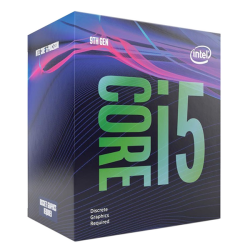Description
This is a brief summary of the Intel Core I5-9400F Processor. This processor is a 2.9GHz 9MB processor that is compatible with Intel Optane Memory. This processor also has Intel Turbo Boost Technology that dynamically increases the processor's frequency as needed. This processor also has Intel Virtualization Technology (VT-x), Intel Virtualization Technology for Directed I/O (VT-d), and Intel VT-x with Extended Page Tables (EPT). This processor also has Idle States that save power when the processor is idle. This processor also has Enhanced Intel SpeedStep Technology that enables high performance while meeting the power-conservation needs of mobile systems.
Intel Optane Memory Supported
Intel Optane memory is a revolutionary new class of non-volatile
memory that sits in between system memory and storage to accelerate
system performance and responsiveness. When combined with the
Intel Rapid Storage Technology Driver, it seamlessly manages
multiple tiers of storage while presenting one virtual drive to the
OS, ensuring that data frequently used resides on the fastest tier
of storage. Intel Optane memory requires specific hardware and
software configuration.
Intel Turbo Boost Technology
Intel Turbo Boost Technology dynamically increases the processor's
frequency as needed by taking advantage of thermal and power
headroom to give you a burst of speed when you need it, and
increased energy efficiency when you don't.
Intel Virtualization Technology (VT-x)
Intel Virtualization Technology (VT-x) allows one hardware
platform to function as multiple virtual platforms. It offers
improved manageability by limiting downtime and maintaining
productivity by isolating computing activities into separate
partitions.
Intel Virtualization Technology for Directed I/O
(VT-d)
Intel Virtualization Technology for Directed I/O (VT-d) continues
from the existing support for IA-32 (VT-x) and Itanium processor
(VT-i) virtualization adding new support for I/O-device
virtualization. Intel VT-d can help end users improve security and
reliability of the systems and also improve performance of I/O
devices in virtualized environments.
Intel VT-x with Extended Page Tables (EPT)
Intel VT-x with Extended Page Tables (EPT), also known as Second
Level Address Translation (SLAT), provides acceleration for memory
intensive virtualized applications. Extended Page Tables in Intel
Virtualization Technology platforms reduces the memory and power
overhead costs and increases battery life through hardware
optimization of page table management.
Intel 64
Intel 64 architecture delivers 64-bit computing on server,
workstation, desktop and mobile platforms when combined with
supporting software. Intel 64 architecture improves performance by
allowing systems to address more than 4 GB of both virtual and
physical memory.
Instruction Set
An instruction set refers to the basic set of commands and
instructions that a microprocessor understands and can carry out.
The value shown represents which Intel's instruction set this
processor is compatible with.
Instruction Set Extensions
Instruction Set Extensions are additional instructions which can
increase performance when the same operations are performed on
multiple data objects. These can include SSE (Streaming SIMD
Extensions) and AVX (Advanced Vector Extensions).
Idle States
Idle States (C-states) are used to save power when the processor is
idle. C0 is the operational state, meaning that the CPU is doing
useful work. C1 is the first idle state, C2 the second, and so on,
where more power saving actions are taken for numerically higher
C-states.
Enhanced Intel SpeedStep Technology
Enhanced Intel SpeedStep Technology is an advanced means of
enabling high performance while meeting the power-conservation
needs of mobile systems. Conventional Intel SpeedStep Technology
switches both voltage and frequency in tandem between high and low
levels in response to processor load. Enhanced Intel SpeedStep
Technology builds upon that architecture using design strategies
such as Separation between Voltage and Frequency Changes, and Clock
Partitioning and Recovery.
Thermal Monitoring Technologies
Thermal Monitoring Technologies protect the processor package and
the system from thermal failure through several thermal management
features. An on-die Digital Thermal Sensor (DTS) detects the core's
temperature, and the thermal management featu
